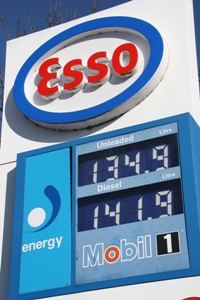
The price of diesel has hit a record high, having risen by 10p per litre (ppl) in 12 months – a 7% increase.
Diesel is currently at 143.05ppl, a level which could derail Government plans to curb inflation, according RMI (Retail Motor Industry Federation) Petrol chairman Brian Madderson.
Global factors including rising crude oil prices, closing refineries and pressure on supply mean by Easter fuel prices may be even higher.
Inflation for diesel is now almost double the Consumer Price Index (CPI) of 3.6%. Madderson said the coming March Budget is the ideal opportunity for chancellor George Osborne to cut fuel duty, as he did last year. Madderson also called on the Government to ease the pressure on the economy by ditching plans to raise fuel duty by 3.02ppl from August 1, 2012. Such a rise would result in a 4.00ppl price hike once VAT at 20% is included.
Madderson said: “It’s all very well for the Government and the Bank of England to declare CPI is heading down, but try telling that to our cash-strapped retailers and to the millions of motorists, truckers and van drivers now paying an average 143.05ppl for their diesel. We are seeing run-away inflation for diesel, and petrol is little better.”
On Friday (February 17), RMI Petrol made a formal submission to the Office of Fair Trading (OFT) recommending it conduct an urgent new study into the UK fuels market.
“This record price for diesel, plus the rising costs of petrol, means household budgets, big business and small and medium sized operators are all being squeezed by these high fuel prices. Our economic recovery seems to have stalled and Government must resist the temptation to hike fuel tax,” said Madderson. “We have not seen prices like this since the record was set on May 9, 2011, during the ‘Arab Spring’ uprisings when diesel hit 143.04ppl. RMI Petrol had warned the Government this worrying price rise was inevitable and now it is with us. It must cast serious doubt over any hope of the Government hitting its 2% inflation target by the Autumn.”
Petrol costs are also on the rise, 5% up on February 2011 (though the average at 135.09ppl for petrol is short of the May 2011 record of 137.43ppl).
RMI Petrol’s report to the OFT calls for an immediate investigation into the UK fuels market under the Enterprise Act: 2002. Madderson said: “Business and consumers deserve the truth about the costs and pricing of such a vital commodity.
“Alleged unfair pricing and predatory pricing tactics by certain hypermarkets and oil companies are driving independent operators out of business at the rate of 250 to 300 sites a year. This death of the independent fuel retailer will lead to higher prices and a loss of refuelling facilities, particularly in our rural areas.
“This will be the most important study of the troubled UK fuels market for more than a decade. Rising pump prices show no sign of abating. Now more than ever it is absolutely crucial that the OFT obtain real transparency into the structure of wholesale costs and retail competition. We would welcome, as we know would many MPs would welcome, swift action by the OFT to progress this study.”
In 1990 there were more than 20,000 forecourts. Today there are just 8,500 – a massive drop of nearly 60% – leaving fuel deserts where motorists have to drive miles to find a garage. The latest victims are Scottish petrol station chain Calanike, with 19 outlets and 170 employees, which went into receivership in January.
Pressure on pump prices continues to grow. Goldman Sachs predicts Brent Crude will push through the US$120/barrel barrier within three months due to greater global demand and production shortages across Europe. Several refineries remain for sale and others have closed either for extended maintenance or due to lack of profitability, all of which puts more pressure on retail prices.


